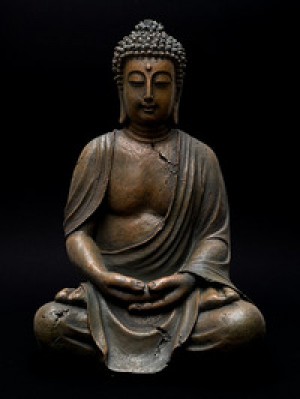Born and bread to be a king, Siddhattha Gotama left all his worldly pleasures and possessions to learn about the world and find the true meaning of existence. After being shielded from both religion and human suffering during his life, he had eye and mind-opening experiences through travel,...
show more
Born and bread to be a king, Siddhattha Gotama left all his worldly pleasures and possessions to learn about the world and find the true meaning of existence. After being shielded from both religion and human suffering during his life, he had eye and mind-opening experiences through travel, meditation, and study that would lay the groundwork for one of the world's most prominent religions.A seer revealed to Siddhattha's father, a prominent leader of his kingdom, that his son was to become a great holy leader. There was nothing his father could do to interfere with fate and destiny. Buddha's mother passed away upon his birth, but his childhood was filled with anything and everything he desired. He was well taught and became well learned in both books and athletics - namely martial arts and chariot tactics. Siddhattha's father never revealed the seer's message; instead, he prepared his son for the throne. In doing so, he made Siddhartha marry. His wife bore one son, named Rahula.After 29 years of serving as a prince over the kingdom and now married, Siddhartha wasn't satisfied with life. After much meditation, he decided to leave his kingdom behind, strip himself of his worldly goods live an ascetic way of life in order to understand the true meaning of the universe.Siddhattha meditated with great monks and attempted to overcome suffering through suffering itself, and would nearly starve himself and meditate for endless hours trying to reach higher levels of consciousness. He still wasn't satisfied and felt that some other approach besides complete self-denial was the answer. He thought about his childhood, of sitting in nature on a beautiful day he had fallen quite naturally into a deep contemplation. Then, as he reflected on this while sitting under a Bodhi tree, he tried the same approach and further and further deepening his concentration and developing deep insight he attained Nirvana, the Awakening.The Buddha, or Awakened One, as he was called by his disciples concluded that human suffering was not inevitable, and could be avoided if ignorance was destroyed so he developed and preached the Dhamma, The Law, which became the pillars of his newfound pragmatic philosophy. Women, men, and all races of people had the potential to become awakened. They could enter into complete liberation from worldly suffering in this very life by attaining Nirvana. Telling his followers not to worship him and that he was not a god, he encouraged them to strive to lead a life of goodness and spiritual awakening. In doing so, he founded a faith that spread from the Indian sub-continent to the rest of the world.
show less

